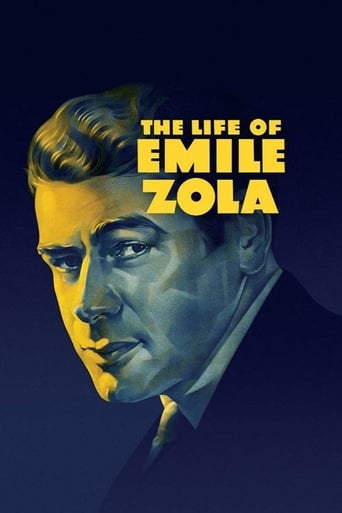grantss
The story of Emile Zola, French writer and social commentator. We track his life from his days as a struggling artist, sharing an apartment with Paul Cezanne, to his first bestselling book, and resulting elevation from poverty, to his forays into social and political commentary through his books, to his involvement in the Dreyfuss Affair.Quite interesting and edifying. I must admit that I had not heard of Emile Zola or the Dreyfuss Affair before this movie. Having seen the influence of the man on society and literature I am now embarrassed to say that. Clearly incredibly talented and principled and willing to put his own neck and reputation on the line in order to fight injustice.The movie captures these qualities very well. I was expecting a rather dry, blow-by-blow delivery and, while the plot does develop in linear form, it is never dull and is always engaging.Won the 1938 Best Picture Oscar.
evanston_dad
Half biopic, half fictionalization of the famed Dreyfus affair, "The Life of Emile Zola" nabbed Warner Bros. its first Best Picture Academy Award in 1937.It's a handsome, intelligent production, even if it is a bit sanctimonious and heavy handed in its hagiography of Zola. I expected that from a film of this time period, though, so it didn't get in the way of my enjoyment. I had the same reaction to Paul Muni in the title role that I always have to his performances -- in his opening scenes I didn't know if I would be able to handle two hours of his eye-rolling, scenery-chewing overacting, but before very long, he had won me over and impressed me with his range. Joseph Schildkraut won the Best Supporting Actor award in what was only the second year for that category for his portrayal of Dreyfus. Gale Sondergaard plays Dreyfus's suffering wife the year after she won the very first Supporting Actress Oscar for her performance in "Anthony Adverse." "The Life of Emile Zola" is an early example of how important the art of makeup is outside of monster movies in physically transforming actors into the characters they're playing.In addition to its wins for Best Picture and Best Supporting Actor, the film was awarded the Oscar for Best Screenplay. It received ten nominations total, which was a new nomination record at the time. The categories in which it was nominated but did not win were: Best Director (William Dieterle), Best Actor (Muni), Best Original Story, Best Assistant Director (Russ Saunders), Best Art Direction, Best Scoring, and Best Sound Recording.Grade: A-
gavin6942
The biopic of the famous French muckraking writer (Paul Muni) and his involvement in fighting the injustice of the Dreyfus Affair.Certain scenes have been interpreted in the context of the time as a reaction to the increasing repression of Nazi Germany. Critic David Denby in 2013 noted that, while the movie featured progressive rhetoric in Zola's last speech, overall it was "a perfect example of the half-boldness, half-cowardice, and outright confusion that marked Hollywood's response to Nazism and antisemitism in the nineteen-thirties." For instance, the film never mentioned "antisemitism" or "Jew".I find it very interesting that you can have a film about these topics without ever saying the words. Possible? Obviously. But it seems like you would almost have to go out of your way.One could question the relevance of this film today (2016). Not that the message is not important or anything like that, but who knows what the Dreyfus Affair was? A major historical event, yes, especially in France, but I doubt sincerely that 1 out of 100 Americans knows what it was about.
richard-1787
This movie beat out such magnificence pictures as Captains Courageous, The Good Earth, and Lost Horizon to win the Academy Award for Best Picture of 1938. I think that was stretching it.What is truly great here is the story it tells, starting about a half-hour into the picture: Zola's involvement in the overturning of the condemnation of French army officer Alfred Dreyfus for treason. That condemnation was one of the great stains on French history, an example of anti-Semitism and rabid militarism. When the movie tells that story, all hearts are moved.But are they moved by the WAY this picture tells that story, or just by the story itself? It is the same question one might pose concerning The Diary of Anne Frank. The difference can be seen in a true masterpiece like Shindler's List, where the story, again, is deeply moving, but the TELLING of the story is equally masterful.I don't think Dieterle's telling of Zola's involvement of the Dreyfus story is particularly remarkable. Muni gives a very fine performance as Zola, certainly. But I don't think this script, which won an Academy Award for best writing, or Dieterle's direction of it, for which he got an Academy Award nomination, are particularly good, much less great.If you don't know the story, watch this, most certainly. It doesn't disgrace it. But if you know such great movies as Captains Courageous, Lost Horizon, and The Good Earth (it was a good year for Paul Muni), don't expect this to live up to those.It must have been a strange year for the Academy: they also gave Louise Rainer the Best Actress Award, when she was easily bested by all four of her competitors: Irene Dunne in The Awful Truth, Greta Garbo in Camille (yes, overdone, but great even so), Janet Gaynor in A Star is Born, and Barbara Stanwyck in Stella Dallas, a weeping but powerful picture. I also don't see how Joseph Schildkraut got the Oscar for Best Supporting Actor for his small portrayal of Dreyfus in this picture against Roland Young as Topper, or even H.B. Warner in Lost Horizon. Why the Prisoner of Zenda got almost shut out of the Oscars that year I don't understand either.




